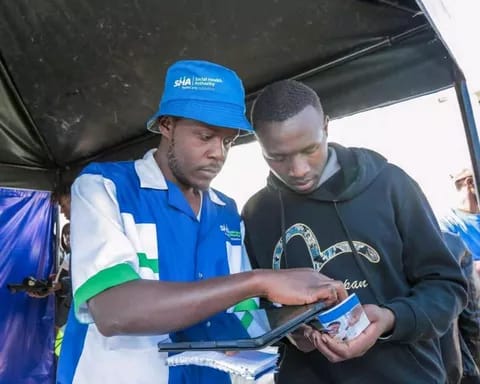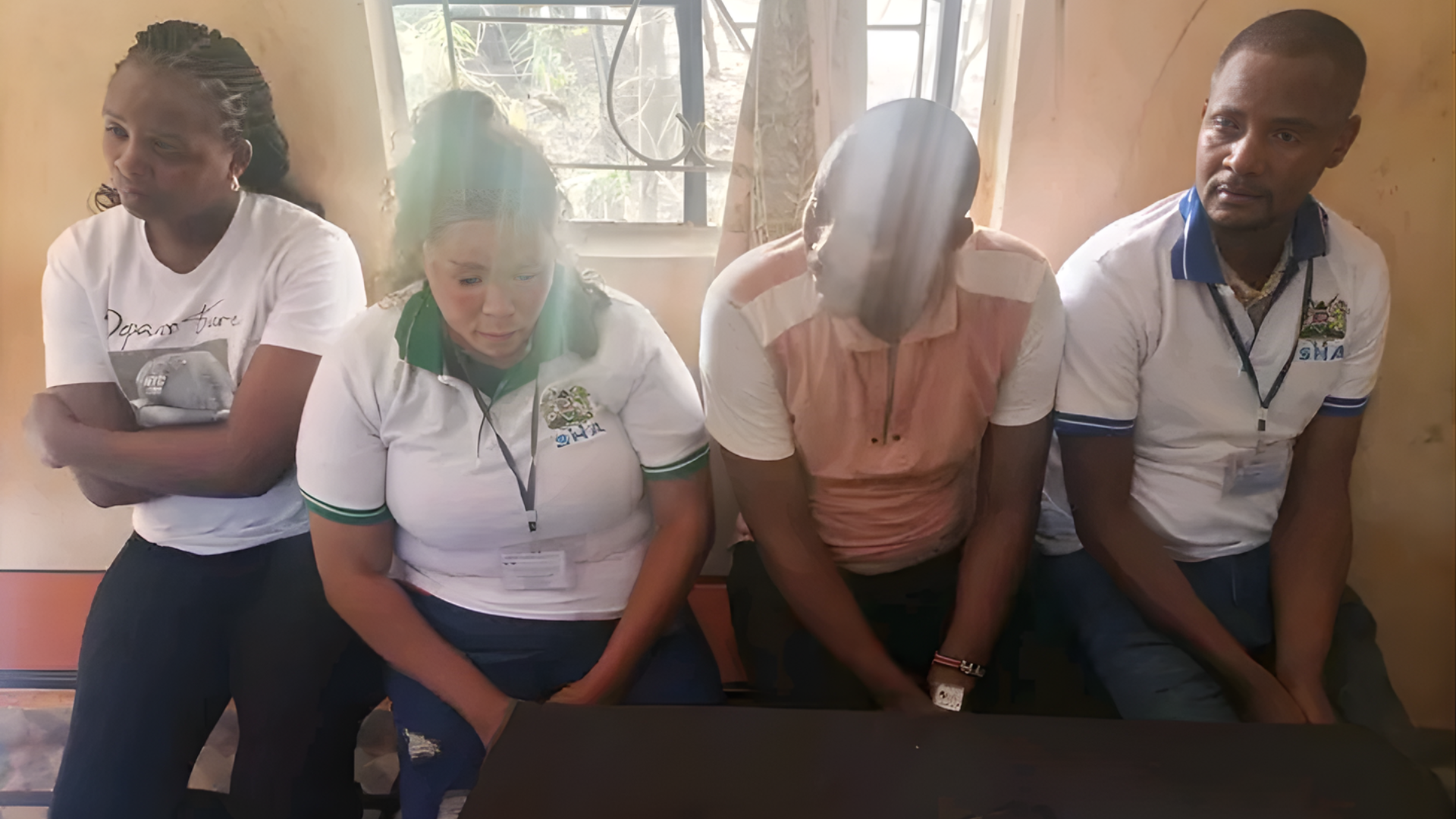In the quiet town of Marimanti, nestled along the dusty roads of Tharaka-Nithi County, a seemingly routine interaction at a local market turned into a nightmare for one resident last week. On a sweltering afternoon, under the guise of offering free health insurance registration, four smooth-talking strangers approached 52-year-old farmer Joseph Mwangi with promises of government-backed medical coverage. What began as a conversation about affordable healthcare quickly unraveled into a meticulously orchestrated theft, leaving Mwangi Sh251,000 poorer and the community reeling from the betrayal.
The suspects—Peter Muriithi, 38, Catherine Kinyua, 32, Lilian Njeri, 29, and Samuel Mbuthia, 41—had arrived in Marimanti earlier that morning in a sleek Toyota Prado, its polished exterior a stark contrast to the rugged pickups and boda bodas that dominate the local landscape. Dressed in crisp white shirts adorned with counterfeit Social Health Authority (SHA) badges, they set up a makeshift booth near the central market, complete with laminated flyers touting the benefits of the national health scheme. "Don't miss out on this opportunity," Muriithi called out to passersby, his voice carrying the authoritative tone of someone accustomed to command. "The government is rolling out free registrations today—secure your family's future with SHA coverage right here."
Mwangi, who had been haggling over sacks of maize at a nearby stall, paused when he overheard the pitch. A widower with two school-aged children, he had long worried about the mounting medical bills from his late wife's illness two years prior. The national health insurance program, rebranded under SHA in recent reforms, promised relief for families like his. Intrigued, he approached the group, where Kinyua handed him a form printed on official-looking letterhead. "Sir, this is straightforward," she assured him, her smile warm and disarming. "Just provide your details, and we'll link your phone to the system for instant verification. It's all digital now—no long queues at the offices."
What Mwangi didn't know was that the forms were forgeries, pieced together from publicly available templates and doctored with a home printer. As he filled in his personal information—name, ID number, and mobile contacts—Njeri engaged him in small talk about the rising cost of fertilizers and the erratic rains that had plagued the harvest season. It was a calculated distraction, designed to build trust while Mbuthia, standing slightly apart, fiddled with a second phone, mirroring Mwangi's device. "Hand over your phone for a moment, please," Mbuthia requested politely, holding out his hand. "We need to scan the QR code on this app to activate your account. It takes less than a minute."
Reluctantly, Mwangi complied, watching as Mbuthia tapped away at the screen. In reality, the men had exploited a common vulnerability: the victim's phone was unlocked, and with it in their possession, they swiftly accessed his mobile banking app linked to his savings and credit cooperative (Sacco) account. Using pre-installed malware disguised as the SHA registration app, they initiated a series of rapid transfers. Sh50,000 went to a fuel station in Embu, another Sh100,000 to an electronics shop in Meru, and the remainder scattered across virtual wallets that would later prove untraceable. The entire operation lasted under two minutes, a testament to the syndicate's efficiency.
By the time Mwangi retrieved his phone, the damage was done. "Thank you, sir. You're all set," Kinyua said, returning the device with a flourish. "You'll receive a confirmation SMS shortly. God bless." The group packed up their booth swiftly, the Prado's engine humming to life as they vanished into the winding roads leading toward the county border. It wasn't until Mwangi arrived home and checked his Sacco balance that the horror set in. His account, painstakingly built over a decade of cooperative savings from crop sales and casual labor, stood at zero. "I felt like the ground had swallowed me whole," Mwangi later recounted to investigators, his voice trembling with a mix of anger and shame. "Those people looked so legitimate. They even had the SHA logo on everything. How was I supposed to know?"
Word of the fraud spread like wildfire through Marimanti's close-knit community. By evening, whispers of similar encounters rippled across WhatsApp groups and evening firesides. A shopkeeper down the road recalled seeing the Prado earlier that week, its occupants stopping to "register" a group of elderly women at a church compound. A matatu driver mentioned overhearing the suspects boasting about "big scores" in a roadside eatery. Fueled by these leads, local residents alerted the Marimanti Police Station, where Officer in Charge David Kimani took immediate action. "We can't let these vultures prey on our people," Kimani stated firmly during a press briefing the following day. "This isn't just theft; it's an assault on the trust that holds our society together. We've mobilized our anti-crime unit to hunt them down."
The breakthrough came less than 24 hours later, thanks to a tip from a vigilant fuel attendant in Chuka, some 40 kilometers away. Recognizing the distinctive license plate—KDP 267C—from a circulated alert, the attendant stalled the vehicle under the pretense of a faulty pump while discreetly notifying authorities. A rapid response team from the Directorate of Criminal Investigations (DCI) swooped in, boxing in the Prado on a narrow bridge over the Thagana River. A tense standoff ensued, with Muriithi attempting to negotiate from the driver's seat. "Officers, there's been a misunderstanding," he pleaded, his hands raised in mock surrender. "We're just community health workers doing volunteer work." But the facade crumbled quickly under scrutiny.
A search of the vehicle yielded a trove of incriminating evidence. Tucked in the glove compartment were stacks of forged SHA identification cards, each bearing the suspects' photos alongside fabricated employee numbers. The trunk revealed bundles of branded lanyards, clipboards, and thermal printers used to generate on-the-spot "certificates." Scattered across the seats were over a dozen SIM cards, many registered under aliases, alongside burner phones loaded with fraud apps. "This was no amateur operation," DCI lead investigator Rose Wanjiku explained. "These tools suggest a network that's been active for months, possibly targeting multiple counties."
Among the recovered items was a ledger scribbled in shorthand, detailing at least 15 prior "registrations" in nearby towns like Meru and Imenti North, with payouts totaling over Sh1.2 million. Digital forensics on the phones uncovered transaction logs linking the group to a shadowy financier in Nairobi, though identities remain under wraps pending warrants. The Toyota Prado itself raised eyebrows; its ownership traced back to a leasing company in the capital, rented under a false name just weeks prior. "The vehicle was their mobile headquarters," Mbuthia allegedly confessed during initial questioning, though his lawyer later contested the statement's admissibility. "It got us places quickly, in and out before anyone got wise."
As the suspects were hauled to the Marimanti cells, the weight of their deception settled over the town. Peter Muriithi, the apparent ringleader, had a prior record for petty cons in Embu County, including a 2022 stint for selling fake land titles. A former bank teller who lost his job amid economic downturns, sources close to the investigation describe him as the strategist, leveraging his financial know-how to exploit digital loopholes. Catherine Kinyua, his longtime associate, brought a disarming charm to the scams; neighbors in her hometown of Gituamba recall her as a struggling single mother who "fell in with the wrong crowd" after her husband's death. Lilian Njeri, the youngest, was the distraction expert, her youthful energy drawing in wary elders with tales of empowerment programs. Samuel Mbuthia, a burly ex-security guard, handled the muscle, ensuring smooth getaways and intimidating any who questioned the process.
In custody, the group faces charges of obtaining money by false pretenses, impersonation of public officers, and conspiracy to defraud—offenses that carry a maximum of 10 years under Kenya's Penal Code. Arraignment is slated for Monday at the Kiegoi Magistrate's Court, where prosecutors vow to present a watertight case. "We've got the evidence, the witnesses, and now the confessions starting to trickle in," Wanjiku affirmed. "But this is bigger than four people. We're appealing to anyone who's been approached by similar 'officials' to come forward. Your story could prevent the next victim."
For Mwangi, the road to recovery is daunting. With his Sacco account depleted, he's turned to community fundraising to cover school fees and farm inputs. "I trusted because I had to," he said, sitting on a worn mat outside his mud-walled home. "Health is everything here—who wouldn't want protection? But now, I tell everyone: verify twice, trust once." Local leaders echoed his sentiment, with Tharaka-Nithi Governor Muthomi Njuki convening an emergency forum on financial literacy. "These predators thrive on our desperation," Njuki declared. "We must educate our people on spotting fakes, from badges to apps. SHA is a lifeline, not a lure."
The incident underscores a disturbing surge in impersonation scams across Kenya's rural heartlands. Since the SHA rollout in early 2024, fraudsters have increasingly masqueraded as enrollment agents, preying on low digital literacy and the program's ambitious targets. A 2024 Central Bank report noted a 35% uptick in mobile banking frauds, with cooperatives like Mwangi's losing Sh4.5 billion annually to such schemes. Experts attribute this to the convergence of economic pressures—post-pandemic inflation, erratic weather devastating agriculture—and the digital shift in services. "Scammers are adapting faster than we can regulate," warns cybersecurity analyst Dr. Elias Kariuki of the University of Nairobi. "They use open-source tools to mimic legitimate apps, and with SIM card proliferation, tracing funds is like chasing smoke."
In Marimanti, the arrest has sparked a cautious optimism. Vigilance committees have formed, patrolling markets and sharing scam-spotting tips via loudspeakers. The local Sacco, hit hard by the breach, has rolled out mandatory two-factor authentication workshops. Yet, as investigators delve deeper, questions linger: How many other victims lurk in the shadows, too embarrassed to report? Are there accomplices still at large, perhaps embedded in legitimate SHA offices? "This net is widening," Kimani promised. "From Marimanti to the city, no stone unturned."
As the sun sets over the undulating hills, casting long shadows on Mwangi's empty granary, the town contemplates its fragility. In a place where community is currency and trust the ultimate safeguard, the fraud cuts deeper than any balance sheet. But in the faces of those rallying around the victim—neighbors donating maize, youth organizing awareness drives—there's a quiet resolve. The suspects may have stolen savings, but they haven't pilfered the spirit that binds Marimanti together. And as arraignment day approaches, the scales of justice tilt ever so slightly toward restitution, one recovered SIM card at a time.
This case, though singular, mirrors a national malaise. Across Kenya, from the coastal dunes of Mombasa to the highlands of Nyeri, similar tales unfold weekly. In Kisii last month, a trio posing as Kenya Power officials drained Sh800,000 from elderly pensioners by "updating meters." In Kitui, fake agricultural extension officers absconded with seed money meant for drought relief. The common thread? Exploitation of public good intentions, wrapped in the trappings of authority. SHA, with its noble aim of universal coverage, has inadvertently become a magnet for mischief. Launched amid fanfare to consolidate NHIF and other schemes, the authority processes over 20 million enrollments yearly, but gaps in outreach leave room for interlopers.
For the suspects, the glamour of the con has soured into stark reality. Confined to dimly lit cells, stripped of their props, they await a reckoning that could redefine their lives. Muriithi, once the charismatic frontman, now pores over legal aid pamphlets, his bravado faded. Kinyua weeps quietly for her children, left with relatives while she navigates the courts. Njeri and Mbuthia, hardened by prior scrapes with the law, trade stoic glances, perhaps plotting appeals or alibis. But as Wanjiku's team combs through call logs and geolocation data, the web tightens.
Back in Marimanti, Mwangi plants his next crop with borrowed seeds, his phone now password-protected and apps vetted. "I'll get it back, somehow," he muses, eyes on the horizon. "Not just the money—the faith in strangers." It's a sentiment the town clings to, a beacon amid the scam's long shadow. As Kenya grapples with its digital dawn, stories like this serve as stark reminders: progress demands vigilance, and protection begins at home.































